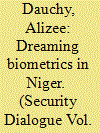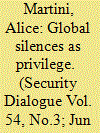|
|
|
Sort Order |
|
|
|
Items / Page
|
|
|
|
|
|
|
| Srl | Item |
| 1 |
ID:
190677


|
|
|
|
|
| Summary/Abstract |
Since 2015, Niger has been actively committed to migration control in West Africa in the context of the European Union Emergency Trust Fund for Africa. To enable better comprehension of the making of security in Niger, this article studies the implementation of biometrics under the EU Trust Fund by international agencies (Interpol, the International Organization for Migration, UNHCR) and national actors. Drawing on in-depth interviews, observation and anthropology of aid studies, I argue that biometrics is a travelling organizational model translated into a multiscalar process by state and non-state actors embedded in relations of power. Biometric technologies cannot be reduced to an added-value instrument for Nigerien authorities in order to enhance legibility, to better identify Nigeriens and foreigners crossing Niger’s borders within the free-movement area of ECOWAS (Economic Community of West African States). I focus on heterogeneous actors’ situated discourses and practices to demonstrate that they do not share the same dream about biometrics. In practice, however, biometrics helps international actors to produce their own security knowledge in Niger that, in the end, augments the capacity to trace ECOWAS citizens and reinforce the EU border regime.
|
|
|
|
|
|
|
|
|
|
|
|
|
|
|
|
| 2 |
ID:
190678


|
|
|
|
|
| Summary/Abstract |
On 17 June 2017, Ali Khamenei, the supreme leader of the Islamic Republic of Iran, called on pro-regime vigilantes to ‘fire at will’ or to act on their own discretion in putting the state’s Islamic teaching into practice without the need to consult either their superiors or the relevant authorities. Our article argues that, since 1979, the policy of ‘firing at will’ has been the defining feature of the Islamic Republic’s model of governance and corresponds to the spirit of its constitution. Inspired by the scholarship on disciplinary policies, this article seeks to contextualize the ‘firing at will’ policy within the ethno-religious and racial discourse embodied in and warranted by the Islamic Republic’s constitution. Finally, by discussing the state’s violent treatment of Kurdish kolbers (cross-border laborers), we will show how the Iranian state’s internal colonial policies have engendered a state of exception and normalized the daily spectacle of violence in Eastern Kurdistan.
|
|
|
|
|
|
|
|
|
|
|
|
|
|
|
|
| 3 |
ID:
190679


|
|
|
|
|
| Summary/Abstract |
Silences are not only absences in the spoken discourse or gaps in the discursive texture of international politics. They are important nodes of this texture and, as such, they constitute the political too. The said and the unsaid may work together to reify knowledge and shape international politics. Starting from this idea, this article scrutinizes global counter-terrorism as a discursive formation, composed of a spoken and an unspoken sphere. Within the silent dimension, the work focuses specifically on the silences in far-right terrorism and extremism. Scrutinizing global counter-terrorism as a racialized formation, the article argues that these silences are produced and reproduced by whiteness. Within the international community’s debates, whiteness gives rise to two kinds of silence – silence as the unspoken and the spoken as silencing. Examining them through the prism of whiteness, the article shows that these silences allow the maintenance of white privilege. This is the privilege of not being identified as a terrorist Other and not becoming the object of counter-terrorism measures, while having this privilege silenced and hidden. This work thus shows that, as gears of discursive formations, silences are racialized and may have colors – in this case, the color of white privilege.
|
|
|
|
|
|
|
|
|
|
|
|
|
|
|
|
| 4 |
ID:
190681


|
|
|
|
|
| Summary/Abstract |
From Baghdad’s ‘Emerald City’ to Kabul’s ‘Kabubble’, international green zones have been characterized as ‘bunkerized’ and temporary. Despite efforts to make these spaces appear sealed, they are more porous than we assume. Drawing on fieldwork in Mogadishu and research with private security contractors, this article reconceptualizes international enclaves in terms of their inherent plasticity, moulded by the mobilities, intentions and bureaucracies of those within. The article illustrates the heterogenous sociospatial relations within Mogadishu’s green zone, arguing that it is sustained through internal frictions and transgressive spatial practices that are not captured by the bunkerization motif. The limits of bunkerization are revealed most starkly through the work of security contractors who enjoy greater mobility and access to information than many of the green zone’s transient international workers. They assume the gatekeeper role, sustaining conditions of manageable insecurity by ordering the messy sociopolitical space of the city into bounded zones. Beyond the façade of the enclave, however, their mobility is reliant on ‘local’ Somali partners navigating the complexities of Mogadishu on their behalf. As an interface between the secure inside and the dangerous outside, some contractors have emerged as opportunistic power-brokers connecting Somali entrepreneurs on the outside to the resources within.
|
|
|
|
|
|
|
|
|
|
|
|
|
|
|
|
| 5 |
ID:
190680


|
|
|
|
|
| Summary/Abstract |
In 2016, the US-based private military contractor TigerSwan was denied a license to operate in North Dakota. Nonetheless, it coordinated a counterinsurgency (COIN) campaign employing war-on-terror tactics, brutalizing Indigenous and allied water protectors associated with the Indigenous-led movement to stop the Dakota Access Pipeline (#NoDAPL) on Standing Rock Lakota territory. This article takes COIN as an analytic to show that US settler colonialism is a multilateral, internally conflicted, and anxious mode of power. The settler state both depends upon and disavows anti-Indigenous and anti-Black violence enacted by rogue civilian individuals and organizations, a phenomenon here termed ‘more-than-state policing’. The repression of #NoDAPL was not solely a boomerang by-product of the global war on terror but rather exposes an established infrastructure of settler colonial COIN intrinsic to US normal politics, in which Indigenous resistance and sovereignty are constructed as metastasizing, viral threats to settler colonial legitimacy. As modern COIN warfare has evolved from four centuries of North American settler colonial invasion and governance, settler colonial studies are key to grasping 21st-century topics of war, imperialism, securitization, resource extraction, and climate justice.
|
|
|
|
|
|
|
|
|
|
|
|
|
|
|
|
|
|
|
|
|